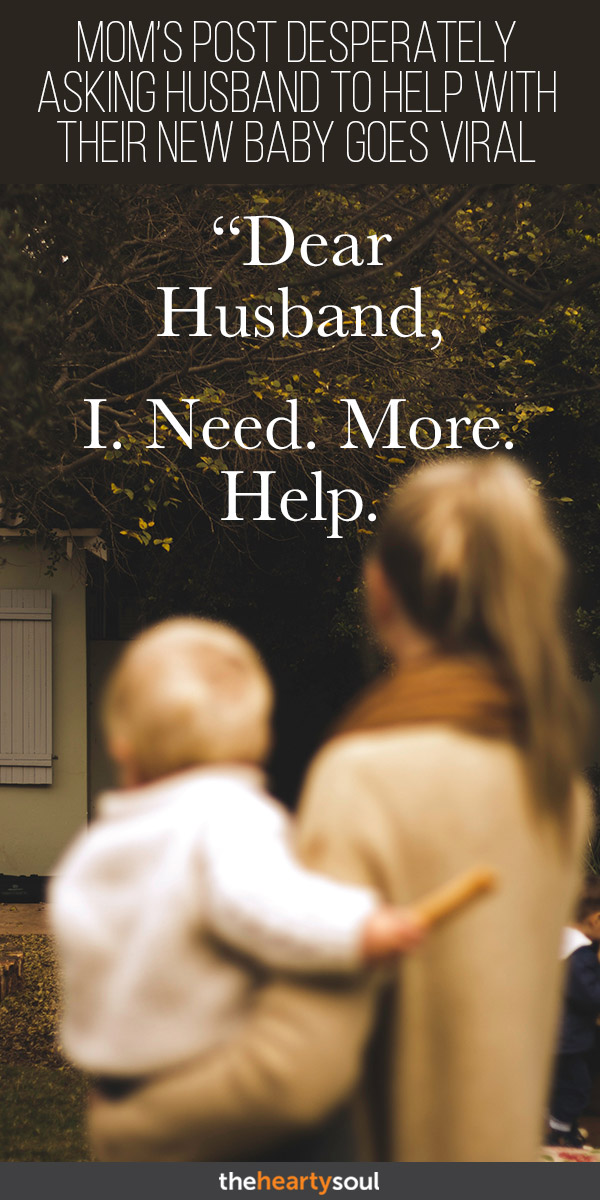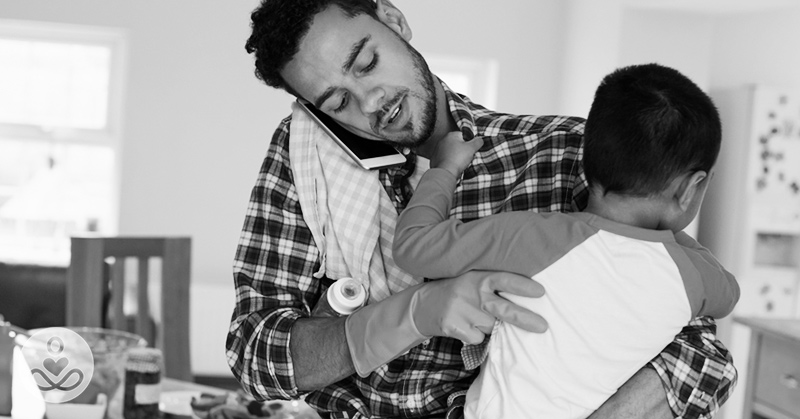Most moms and wives find themselves overwhelmed and stressed out by the numerous day-to-day tasks they are required to juggle. Even more so now than they did before!
In addition to being a wife and a mother, women have full-time jobs and careers they have to maintain. Even with the help of babysitters, women today often find themselves way in over their heads.
That’s why the support of a husband is vital for a woman. When a woman doesn’t feel like she is getting the level of support she needs, often what ends up happening, is she begins to consciously (or unconsciously) resent her husband.
Meet Celeste Erlach, a 38-year-old mother of two, and the blogger behind The Ultimate Mom Challenge.
Celeste wrote an open letter to her husband asking for some desperately needed help. After her post was shared on the “Breastfeeding Mama Talk,” …. it quickly went viral.
Celeste’s Open Letter
“Dear Husband,
I. Need. More. Help.
Last night was hard for you. I asked you to watch the baby so I could go to bed early. The baby was crying. Wailing, really. I could hear him from upstairs and my stomach knotted from the sound, wondering if I should come down there and relieve you or just shut the door so I could get some desperately needed sleep. I chose the latter.
You came into the room 20 minutes later, with the baby still frantically crying. You placed the baby in the bassinet and gently pushed the bassinet just a few inches closer to my side of the bed, a clear gesture that you were done watching him.
I wanted to scream at you. I wanted to launch an epic fight that very moment. I had been watching the baby and the toddler all damn day. I was going to be waking up with the baby to feed him all damn night. The least you could do is hold him for a couple of hours in the evening so I can attempt to sleep.
Just a few hours of precious sleep. Is that too much to ask?
I know we both watched our parents fulfill the typical mother-father roles growing up. Both our mothers were the primary caretakers and our fathers were relatively hands–off. They were excellent dads, but they weren’t expected to spend a significant amount of time changing diapers, feeding, caring, and tending to the kids. Our mothers were the superwomen who maintained the family dynamics. Cooking, cleaning, and raising the children. Any help from dad was welcome but unexpected.
I see us falling into these family dynamics more and more each day. My responsibility to feed the family, keep the house clean, and take care of the kids is assumed, even as I return to work. I blame myself for most of it too. I have set the precedent that I can do it. And in truth, I want to. No offense, but I’m not sure I want to know what a week’s worth of dinner would look like with you in charge.
I also see my friends and other moms doing it all, and doing it well. I know you see it, too. If they can manage it, and if our mothers did it so well for us, why can’t I?
I don’t know.
Maybe our friends are playing the part in public and secretly struggling. Maybe our moms suffered in silence for years and now, thirty years later, they simply don’t remember how hard it really was. Or maybe, and this is something I berate myself over every single day, I’m just not as qualified for the job as everyone else. And as much as I cringe just thinking it, I’m going to say it: I need more help.
Part of me feels like a failure for even asking. I mean, you do help. You are an amazing father, and you do a great job with the kids. And besides, this should come easy to me, right? Motherly instincts, no?
But I’m human, and I’m running on five hours of sleep and tired as hell. I need you.
In the morning, I need you to get our toddler ready so I can care for the baby and make everyone’s lunches and drink a cup of coffee. And no, getting the toddler ready does not mean plopping him in front of the TV. It means making sure he went potty, giving him some breakfast, seeing if he wants water, and packing his bag for school.
At night, I need an hour to decompress in bed knowing our toddler is asleep in his room and the baby is in your care. I know it’s hard to listen to the baby cry. Believe me, I know. But if I can watch and pacify the baby for the majority of the day, you can do it for an hour or two at night. Please. I need you.
On weekends, I need more breaks. Times where I can get out of the house by myself and feel like an individual. Even if it’s just a walk around the block or a trip to the grocery store. And some days when I’ve scheduled swim class and play dates, and it seems like I’ve got it all under control, I need you to offer to lend me a hand. Or suggest I go lay down during the kids’ naptime. Or start putting away the dishes without me suggesting it. I need you.
Lastly, I need to hear you’re grateful for all I do. I want to know that you notice the laundry is done and a nice dinner has been prepared. I want to know you appreciate that I breastfeed at all hours and pump when I’m at work when it would be easier for me to formula feed. I hope you notice that I never ask you to stay home from your networking events and sport activities. As the mom, it’s assumed I’ll be home all the time and always available to care for the kids while you’re out and I feed that assumption by, well, being home all the time.
I know it’s not how our parents did it, and I hate even asking. I wish I could do it all and make it look effortless. And I wish I didn’t need kudos for doing things most people expect from a mom. But I’m waving a white flag and admitting I’m only human. I’m telling you how much I need you, and if I keep going at the pace I’ve been on, I will break. And that would hurt you, the kids, and our family.
Because, let’s face it: you need me, too.”
The Second Shift

The media often portrays the ways gender roles have changed now that women have joined the workforce. But how often does it discuss gender roles at home?
Even though both husband and wife work now, traditional gender roles have not entirely changed in the home. According to an article in The Nation, On a typical day, nearly half of all women will do housework (after their 9-5), whereas only 20% of men will do the same.
Also known as the second shift, women put more time into taking care of the home—3 more hours each week, in comparison to men who carved out 3 hours of leisure time.
Even mothers who work full-time will still put in a week and a half’s worth more time on household tasks than their male partners each year.
“Stop Nagging!”

Since women are battling against years of conditioning, when they do conjure up the courage to ask for more help, they run the risk of being called a nag. Most women are often left hopeless wondering if their husbands will ever be mindful of doing more. But there is hope.
Communication, Communication, Communication

It may sound cliche, but communication really is key. It should be a top priority for any couple, kids or no kids. Setting expectations can make a huge difference in keeping your union strong.
The cultural stigma of women holding it all together weighs heavy on wives, usually without husbands noticing. That’s why for hubbies and dads reading this article, it’s important that you make it a point to DO rather than ask or merely coast along.
Celeste tells Bored Panda, “My husband and I talk about this topic fairly regularly, he knows my concerns and we work on that daily.” The reason I wrote an open letter is that I know lots of women facing similar issues. I discuss this topic all the time with my friends. I wanted to put it out there to start a larger discussion. I wanted women to feel encouraged to ask for help. I wanted husbands to know we need more help.”
Modern Day Father

The stay-at-home dad population is surprisingly growing! According to the U.S. Census Bureau, 105,000 fathers stayed home to care for their families in 2002. That figure jumped to 140,000, just six years later.
The National Institute of Child Health and Human Development determined that fathers were more likely to be involved in caregiving when:
- They worked fewer hours than other fathers
- They had favorable psychological adjustment characteristics (e.g., high self-esteem, lower levels of depression and hostility, and coping well with the crucial tasks of adulthood)
Other research indicates that the impact of a father’s care on a child’s development is just as significant as the impact of the mothers. When fathers cared for children, there were incredible benefits.
A father’s care actually helps a child develop their sense of place in the world. As a result, this profoundly helps with their social, emotional and cognitive development.
Good News For Moms

More recently, many husbands are choosing to share in child rearing and participating in running the household.
Ben Siegel, M.D., FAAP, professor of pediatrics and psychiatry at Boston University School of Medicine and chair of the American Academy of Pediatrics, says that fathers participating more and more in their children’s upbringing isn’t a trend but a permanent shift: “more men are organizing their lives around their families.”
The Bottom Line
While there has been a growing shift in the last 10-20 years, “there are still plenty of fathers in need of an upgrade,” says Roland Warren, president of the National Fatherhood Initiative (NFI), a non-profit organization dedicated to promoting responsible fatherhood.
So no matter what the situation, communication is essential. We can’t say this enough. Mums and wives will be much happier when they say:
1. This is how I’m feeling
2. And this is how you can help me
Ps. Whether they care to admit it or not, men need validation too. If they are a being wonderful dad/hubby, let them know! Expressing gratitude benefits both partners in the relationship. When you give appreciation, you often receive even more in return.


